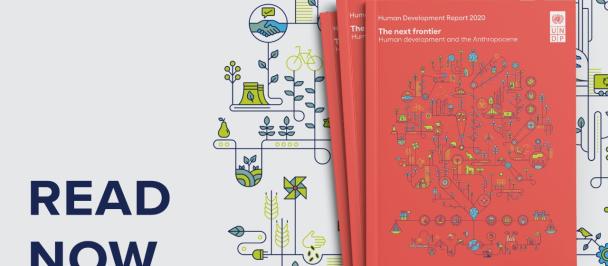The Next Frontier: Human Development and the Anthropocene
Norway Launch of the 2020 Human Development Report
December 16, 2020
As prepared for delivery.
Minister Ulstein, colleagues, friends.
2020 will be remembered as the year in which the human race was humbled by a tiny virus. Scientists have been warning of a pandemic like this for years, as a reflection of the pressures people put on Planet Earth.
Advancing human development while easing planetary pressures is the next frontier for human development, and its exploration lies at the heart of the 30th Anniversary edition of UNDP’s Human Development Report, which we launch with you all here today.
As this report sets out, human pressures on the planet have grown exponentially in the past 100 years. We have achieved incredible things, but we have taken the Earth to the brink.
Climate change; rupturing inequalities; record numbers of people forced from their homes by conflict and crisis: these are the results of societies that value what they measure, instead of measuring what they value.
In fact, the pressures we exert on the planet have become so great that scientists believe the Earth has entered an entirely new geological epoch.
It’s called the Anthropocene, or the Age of Humans. It means that we are the first people to live in an age defined by human choice, where the dominant risk to our own survival is ourselves.
To survive and thrive in this new age, we must redesign a path to progress that respects the intertwined fate of people and planet and recognizes that the carbon and material footprint of the people who have more is choking the opportunities of the people who have less.
Four thousand generations could live and die before the carbon dioxide released from the industrial revolution to today is scrubbed from our atmosphere, and yet decision-makers continue to subsidize fossil fuels, prolong our carbon habit like a drug running through the economy’s veins.
By 2100, the richest countries in the world could experience up to 18 fewer days per year of extreme weather as a result of climate change, while the poorest countries could experience up to 100 days more. That number could still be cut in half if the Paris Agreement is fully implemented.
Excellencies, friends, we are not the last generation of the Anthropocene. We are the ones who get to decide what this -- the first generation of the Anthropocene -- will be remembered for.
And the choices leaders make today as they build forward better from COVID-19 will be fundamental.
Consider the impact of the pandemic on poverty.
There could be 1 billion poor people in the world by 2030 - a quarter due to COVID-19. But it doesn’t have to be that way.
We could invest in a push towards the Sustainable Development Goals (SDGs), with ambitious policy options, social protection, and a deal on debt.
For example, a six-month Temporary Basic Income for nearly 3 billion people during this pandemic would be equivalent to one-third of what poor countries paid in 2020 to service their external debt.
We have experienced a revolution in digital dependence in the past 10 months, but for many, “going virtual” as we are today is just not an option.
Four out of five children were effectively out of school in poorer countries in the first half of this year because of the digital divide. We could let it deepen or we could choose to invest in a once-in-a-generation effort to close it.
I know that Norway understands these choices, and what is at stake right now for people and planet.
For example, this report argues that investing in forests could account for roughly a quarter of all the actions we must take this decade to stop global warming from reaching two degrees Celsius above preindustrial levels.
Norway has played a critical role for years in international efforts to protect the world’s forests.
Your country’s ‘green transition package’, designed to accelerate forward from the impacts of COVID-19 on energy and industry, will be fundamental in building a more sustainable future.
And I hope we can continue to count on Norway as multilateral leader and partner and as we work together towards the SDGs in this Decade of Action.
At UNDP, we are preparing a new, three-part offer to build on the conversation this report has opened. It will include:
- Expertise and tools that help countries to simulate alternative futures based on different policy choices, building on the data in the report;
- integrated programmatic and financial support that goes beyond ‘quick technical fixes’ to accelerate the transition towards greener and more equitable development paths;
- tailored national and local policy dialogues to support the evolution of new social norms and build coalitions for change.
Our support is designed to help decision-makers look beyond recovery, towards 2030, making choices and managing complexity and uncertainty in four main areas: governance, social protection, green economy, and digital disruption.
It builds on our role in technically leading the UN’s socio-economic response to the pandemic.
Excellencies, friends, this is the 30th anniversary of the concept of Human Development. Much has changed since the first HDR challenged the primacy of GDP as a measure of human progress. But hope and possibility have not.
Our future is not about choosing between people or trees. It’s about choosing to do things differently. That is the next frontier for human development.
I truly hope that we today, at this unique moment, we commit to exploring these new frontiers together.
Thank you, Minister Ulstein, for hosting this launch, and thank you to everyone who joined us today

 Locations
Locations

